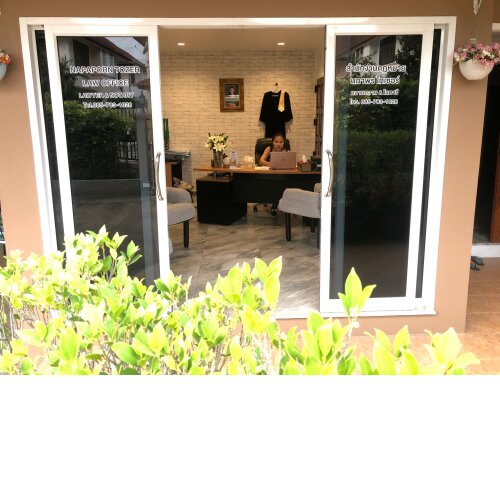Best Divorce & Separation Lawyers in Nakhon Ratchasima
Share your needs with us, get contacted by law firms.
Free. Takes 2 min.
Free Guide to Hiring a Family Lawyer
List of the best lawyers in Nakhon Ratchasima, Thailand
Thailand Divorce & Separation Legal Questions answered by Lawyers
Browse our 10 legal questions about Divorce & Separation in Thailand and read the lawyer answers, or ask your own questions for free.
- Divorce document
- Hi I need a simple uncontested divorce settlement agreement written up. It's very simple 1. I keep my condo 100 percent as was pre marital. 2. She can live my condo rent and maintenance free for two years from date of divorce. 3. We don't owe each other any money.... Read more →
-
Lawyer answer by KSN Bangkok Co., Ltd.
Hi, we can certainly assist you with drafting a simple uncontested divorce settlement agreement, based on the terms you’ve outlined. Our fee for this service starts from THB 20,000, depending on the complexity and any additional legal details that may...
Read full answer - Moving out of the house before a divorce trial
- Can I move out of my wife's house before a divorce trial ?
-
Lawyer answer by GPS Legal
GPS Legal has extensive experience in Family Law and matters of divorce. While we would want to better understand the details behind the question, the basic answer is yes you can move out of your wife’s house before a divorce...
Read full answer - Divorce
- Can I divorce my Thai wife without her help,it's uncontested,no claims
-
Lawyer answer by Mahanakorn Partners Group Co., Ltd
Dear Sir,Thank you for reaching out to us with your inquiry regarding divorce in Thailand. We appreciate your trust in our expertise, and we would be delighted to assist you on the matter.In Thailand, uncontested divorces, where both parties are...
Read full answer
Thailand Divorce & Separation Legal Articles
Browse our 3 legal articles about Divorce & Separation in Thailand written by expert lawyers.
- How to Protect Your Property After Going Through a Divorce in Thailand
- Understanding how to protect your assets and the laws surrounding divorce is vital as a foreigner in Thailand because in the event of a separation from your Thai spouse, you are going in at a disadvantage. Thai law typically favors Thai nationals over foreigners, so having the right knowledge and... Read more →
- How To Get Divorced In Thailand
- Divorce is a major legal process in Thailand comprising several steps. It requires meticulous documentation and adherence to strict laws and often involves complex grounds.There are two types of divorce in Thailand: uncontested and contested divorce.What is an Uncontested Divorce?An uncontested divorce is also known as an “administrative divorce.” This... Read more →
- How to Find a Divorce Lawyer in Thailand
- Divorce is a difficult and emotionally taxing procedure that may be made even more difficult when it takes place abroad, such as may be the case in Thailand. Anyone may feel overwhelmed by the legal complexities, cultural variances, and other divorce-related issues. But with the right assistance, you may locate... Read more →
About Divorce & Separation Law in Nakhon Ratchasima, Thailand
In Nakhon Ratchasima, as in the rest of Thailand, divorce and separation are legal processes that require adherence to specific laws and procedures. The legal system recognized both mutual consent divorces, where both parties agree to the terms of separation, and contested divorces, where one party may not agree to the divorce or its terms. Marriage and family issues are governed by Thailand's Civil and Commercial Code which addresses matters related to property division, child custody, alimony, and more. Given Nakhon Ratchasima's local jurisdiction, there can be regional considerations to understand when proceeding with divorce or separation.
Why You May Need a Lawyer
Engaging a lawyer in divorce and separation proceedings can be vital due to the complexity and emotional nature of these cases. Lawyers can assist in:
- Explaining your legal rights and obligations under Thai law.
- Navigating negotiations, especially if the divorce is contested.
- Handling disputes regarding child custody, support, or visitation rights.
- Ensuring an equitable division of marital property and debts.
- Addressing cases involving international elements, such as expatriate divorces.
- Drafting and submitting necessary legal documents to court.
Ultimately, a lawyer can provide both emotional support and practical solutions, easing what can be a stressful situation.
Local Laws Overview
Divorce laws in Nakhon Ratchasima adhere to the national framework provided by the Thai Civil and Commercial Code. Key aspects include:
- Grounds for Divorce: Divorce can be based on mutual consent or legal grounds such as adultery, desertion, or imprisonment.
- Division of Property: Community property laws apply, meaning property acquired during the marriage is typically divided equally, but pre-marital assets remain with the original owner.
- Child Custody: Custody is generally decided with the best interests of the child in mind, with both parents potentially sharing rights and responsibilities.
- Alimony and Support: Financial support may be granted to a spouse based on needs and circumstances, but is not automatic and must be deliberated during proceedings.
Frequently Asked Questions
What is the difference between a contested and an uncontested divorce?
An uncontested divorce occurs when both parties agree on all terms, including property division and child custody. A contested divorce arises when there is disagreement on one or more issues.
How long does it take to finalize a divorce in Nakhon Ratchasima?
The duration varies. An uncontested divorce can be finalized fairly quickly once all documents are in order. A contested divorce may take longer due to court proceedings.
Can I get a divorce in Nakhon Ratchasima if my spouse lives abroad?
Yes, but the process can be more complex. It's advisable to consult a lawyer to navigate international legal implications.
Is mediation required before going to court for a divorce?
Mediation is not legally required but is often recommended to help reach an amicable agreement between parties.
How is child custody determined?
The court considers the best interests of the child, taking factors like the child's relationship with each parent, the parent's ability to care for the child, and more into account.
What happens to our debts after divorce?
Like property, debts acquired during the marriage are usually considered joint and divided equitably between parties.
Do I have to appear in court for a divorce?
For uncontested divorces, court appearances might be unnecessary. However, contested divorces typically require appearances for hearings.
What documents are needed to file for divorce?
Documents generally include your marriage certificate, identification, financial records, and any evidence supporting legal grounds for divorce.
Can an expatriate file for divorce in Nakhon Ratchasima?
Yes, provided certain residency requirements are satisfied. Legal advice should be sought to clarify these requirements.
What are my options if we disagree on property division?
If an agreement can't be reached, the court will intervene and distribute property based on Thai law principles of equitable division.
Additional Resources
The following resources may be useful for residents of Nakhon Ratchasima seeking legal advice on divorce and separation:
- Thai Ministry of Justice: Provides guides and brochures related to family law.
- Nakhon Ratchasima Provincial Court: Offers information on court procedures and legal assistance.
- Legal Aid Centers: Managed by local legal societies offering free or low-cost advice.
- Embassies: For expatriates, embassies may provide information pertinent to international divorce cases.
Next Steps
If you need legal assistance for divorce and separation, consider the following steps:
- Gather all relevant documents, including financial records and correspondence related to marriage assets.
- Consult with a licensed lawyer in Nakhon Ratchasima specializing in family law. They can provide tailored advice and represent you during proceedings.
- Explore mediation if both parties are open to negotiation; this can be a more amicable and cost-effective solution.
- Contact your local legal support services if you require financial assistance to secure legal representation.
These steps can guide you through the process and help ensure a fair and timely resolution to your case.
Lawzana helps you find the best lawyers and law firms in Nakhon Ratchasima through a curated and pre-screened list of qualified legal professionals. Our platform offers rankings and detailed profiles of attorneys and law firms, allowing you to compare based on practice areas, including Divorce & Separation, experience, and client feedback.
Each profile includes a description of the firm's areas of practice, client reviews, team members and partners, year of establishment, spoken languages, office locations, contact information, social media presence, and any published articles or resources. Most firms on our platform speak English and are experienced in both local and international legal matters.
Get a quote from top-rated law firms in Nakhon Ratchasima, Thailand — quickly, securely, and without unnecessary hassle.
Disclaimer:
The information provided on this page is for general informational purposes only and does not constitute legal advice. While we strive to ensure the accuracy and relevance of the content, legal information may change over time, and interpretations of the law can vary. You should always consult with a qualified legal professional for advice specific to your situation.
We disclaim all liability for actions taken or not taken based on the content of this page. If you believe any information is incorrect or outdated, please contact us, and we will review and update it where appropriate.










